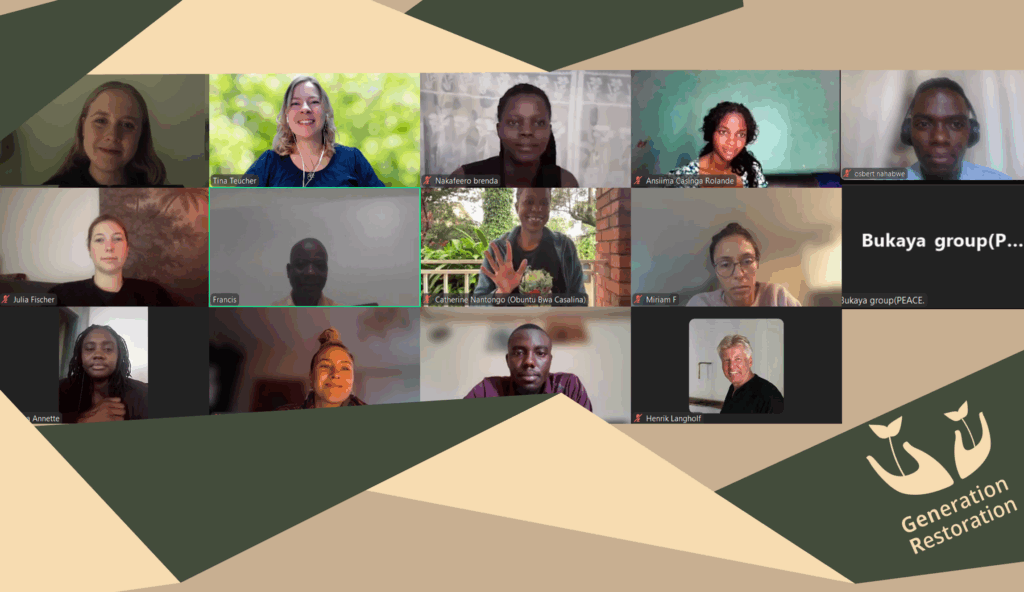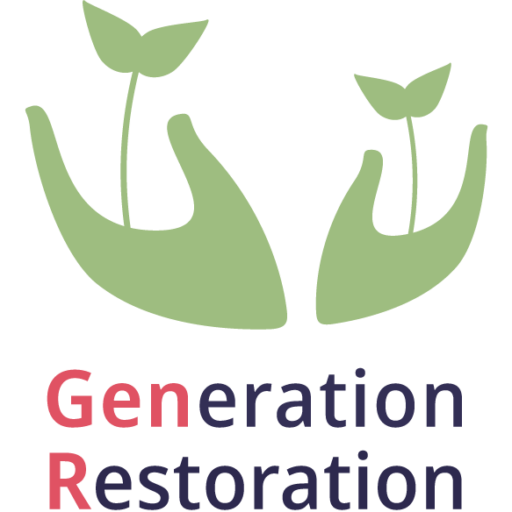
Generation Restoration Roundtable Series
On October 28th, 2024, Generation Restoration e.V. organized a roundtable with 17 participants from various organizations online around a key question:
«How can we scale regenerative solutions
in refugee camps?»
Generation Restoration e.V. aims to actively serve as a bridge builder, connecting and supporting the inspiring initiatives that exist within marginalized groups, including both refugees and host communities. Harnessing the experience of grassroots actors, combining common approaches or objectives, framing those for standard-setting, and – ultimately – approaching international organizations for policy definitions are at the forefront of Generation Restoration e.V’s efforts. The second roundtable of a continuous series has taken the leap from not only sharing but focussing on predominant questions.
The positive impact of sharing and gathering to find solutions for scaling and implementing regenerative solutions, either in-person or online, has been acknowledged by all participants and is the driving factor for the establishment of the roundtable series according to the reasons to participate:
«Learn and connect with other regenerative agriculture practitioners.»
Gloire Mudekuza (Plethora Social Initiative)
«Excited to find an organized collective to learn from, collaborate and grow with.»
Catherine Sekitoleko (Obuntu Bwa Casalina)
«Learning from others and sharing with others.»
Francis Lumbuye (NCFG)
Video recording of the Generation Restoration roundtable on 28 October 2024.
Presentations on documenting Monitoring & Evaluation (M&E) and scaling approaches
The implementation of regenerative practices follows a process of documentation to track the progress and advocate for its scaling. Hence we have invited two of our initiative’s members to share their approach towards documentation.
Paulinho Muzaliwa, founder and CEO from Unidos Social Innovation Centre, shared his documentation method for monitoring and evaluating regenerative projects. He introduced the output, outcome and impact (IOOI) levels to the participants. Here, output means all “immediate” results like soil health, water retention and crop yield. The outcome level touches upon those factors that have an effect on the farmers themselves, like earnings as well as behaviour towards the environment. The third level, the impact level, tracks the impact on the country as a whole and the broader goals that the project wants to achieve, such as contributing to the United Nations’ Sustainable Development Goals (SDGs).
The second speaker, Francis Lumbuye, Co-Founder and Coordinator of Nature and Creativity for the Future Generation (NCFG), devoted his presentation to the documentation of the scaling of regenerative projects. He specifically touched upon a climate mitigation project introducing bio gas. The assessment of scalability was subject to the availability of bio gas in the target areas, the availability of unemployed youth who could be working in such a project, the support of local leaders, the market size for packaged gas in Uganda, its ability to be replicated and the income generation.
Key Questions & Discussions
The second part of the roundtable included two discussion groups on relevant questions for documenting regenerative solutions:
«What do we need to document impact assessment?
We also discussed:
«How far can we standardize documentation on common aspects to advocate for policy changes?»
Our second discussion group reflected on the question «How far can we standardize documentation on common aspects to advocate for policy changes?». It was phrased that it is essential to follow a community approach that might include starting with systemic constellation and visualization. Furthermore, it can include using the same methods, such as the “IOOI method” (Input – Output – Outcome – Impact). In addition to our first speaker on M&E, it was voiced that it is helpful to follow a hypothesis. Additionally, frameworks for impact logic and assessment might be of use. Organizations could, for example, follow guidelines like the Social Impact Navigator “Planning ahead for what happens afterward”. The constellation of the organization itself might also be effective when different roles such as analyzers, facilitators, documenters, and communicators become the standard.
The unique perspectives of all actors in the roundtable are relevant to intrinsically understanding and incorporating themes into advocacy. They showcase that Ugandan organizations are willing to implement regenerative solutions. However, collaboration and coordination make these efforts even more effective.
Network:
Participating organizations & common goals
Generation Restoration (e.V.)
UNIDOS Social Innovation Center
Turning refugees into change makers – that is the goal of the Unidos Social Innovation Centre. In the Nakivale Refugee Settlement in South West Uganda the refugee-led organisation aims at empowering young refugees with entrepreneurial skills.
“Our vision is to completely transform our refugee camp into a regenerative community, where everyone will become self-sufficient. We firmly believe that through developing strong entrepreneurial skills, we will be able to co-create, build resiliency and turn the hard and often painful situations that adversely impacted us in our home countries, into stories of success”, says founder Paulinho. Through the application of permaculture these determined refugees do not only regenerate soil and ecological environment but also their own lives and the community.
Contact Person:
Paulinho Muzaliwa, founder and director of UNIDOS
More infos on UNIDOS.
Nature and Creativity for the Future Generation (NCFG)
Indigenous NGO is working with farmer communities with less resources in Uganda. We are a member of Green light future Union which is a consortium focusing on agroecology. NCFG promotes agroecology, seed regeneration, use of available resources, environmental conservation methods, and safe water in communities.
We have a demonstration farm to showcase what we preach. Agriculture students use it as a practicing classroom. Roundtable discussion on refugees and restoration is important for us to share our experiences, expertise, challenges, and solutions as we aim at environment restoration.
Contact Person:
Francis
Partners Empowering Agro-ecology and Community Education (PEACE)
We are a community-based organisation (CBO) found in Buikwe District, village Bukaya. Majorly with a focus in Agro-ecology which involves environmental conservation, recreation through raising nurseries and tree planting and empowering local smallholder farmers.
Vision: To promote Innovativeness and Climate Action.
Mission: To promote tree planting to smallholder farmers through raising our own nursery beds and by giving out free seedlings to farmers, Rotary Clubs, schools, and the government.
Contact Person:
Peter Kibuuka, Rotarian, Director PEACE
Eco Mamas Uganda
Eco Mamas Uganda: Our mission is to enhance the quality of living for youth, women and families in poor rural areas through education involving environmental sustainability, permaculture, holistic nutrition, herbal medicine, yoga and healthy food preparation.
We are developing a community resource and learning center. We are currently working on the first phase of the construction of the house based on a permaculture concept that will accommodate students, teachers and other guests. We wish to connect with organizations and individuals who are willing to share knowledge or contribute financially in the construction of the house that will help facilitate, trainings and accommodation.
Contact Person:
Adam Suleman, Project Coordinator Eco Mamas Wakalenge Ecovillage
Your Project is Missing?
If you want to share your work with the roundtable network, please send us your organization or project description to vorstand@gen-r.de and we will add it to this online document here.
Join the movement
Coordinating these efforts is the motivation and reasoning behind the establishment of Generation Restoration e.V.
Important Links to follow-up:
- Join WhatsApp Group of the Roundtable
- Join Linkedin Group of Generation Restoration
- Share your projects with us (send them to vorstand@gen-r.de)
- Subscribe for news at www.GenR.world
- distribute the information among your personal and professional network

